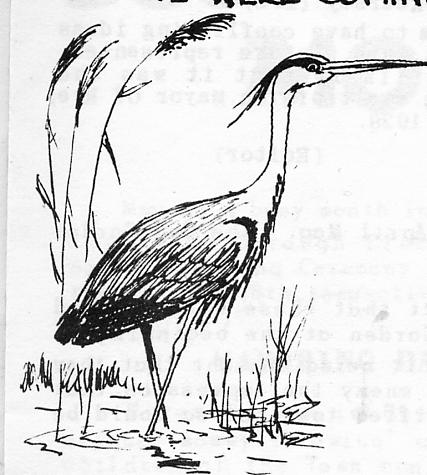By JIMPER’S JOTTINGS February 2007
Winter is now behind us and as the days become noticeable longer, we have the heat of summer to look forward to. You may wonder why I think of February as the end of winter for we can still have snow and ice for as the old saying goes, ‘As the days lengthen so the cold strengthens’. I am not alone in thinking summer is not far away. Wildlife itself knows that winter has lost its grip, trees start to draw the sap up their trunks, buds swell and the grass starts to grow. The weeds in the bottom of the ditches stir and the water changes colour as it clears with more oxygen produced by the new growth.
This last winter has followed like the last five, and gone down in the records book as warmest since records started. Many say it is man causing the climate change but I do not believe that, this old planet we call home has gone through many cycles of change in it’s life and I doubt the human race has anything to do with it.
Man can only interfere with nature not change it. Look at what we have today that we hold so precious, leave it as it is and within a decade nature will have started to reclaim it. ‘Him up there’ is a lousy gardener to our way of thinking but that is only our way of seeing it. Leave your garden unattended a couple years and it soon becomes a jungle, that is how our planet should be, and if ‘He’ wishes to alter our climate and make it a bit warmer ‘He’ will, us mortals will be powerless to stop it.
Blame ‘climate change’ on what you want, it is a fact, will man never learn from history? Nature adapts, so will we have to use the seasons to the best of our ability.
I told you last month that each month I would write of a bird that I consider most apt for the period and there is no other bird I can think of in our part of Britain that suits February, than the old jack Heron. The Grey Heron has adapted to the seasons and often endures hardship in the incubation of their eggs.
The earliest bird to nest he builds a large untidy nest high in the top of tall trees were he is blasted by any chilly winds, these he has to put up with as he has calculated his offspring to arrive with the emerging of the frog spawn into tadpoles. As the chicks grow so the tadpole turns to small frogs to fit the their ever enlarging gullet. Everyone knows the Grey Heron, he can be seen all months of the year either lazily flapping across the sky or standing quietly as still as a rock. Do not be deceived by his lack of movement for he is very agile and strikes with his long bill with remarkable accuracy, he is also very adapt in the tall trees.
The Heron lays green coloured eggs from the middle of January to hatch around valentines day. Viewed from a distance he is a very striking bird with a crest of long feathers that are the only thing to move in a breeze as he patiently waits for prey to swim his way, he is a bird with a brain as his cousins in Japan are telling us. In a Japanese park there is a colony of Herons who have learnt to take a bit of bread that the people throw to the fish and fly to their favourite fishing station, there the bird positions his stolen bait and awaits for a fish to nibble the bread. Having snapped his catch he replaces the bread to await the next poor unsuspecting customer. The Japanese are monitoring these birds to see if the trait is learnt by others in a nearby colony,
Next month’s bird is the true foreteller of summer and looked for by bird lovers.
